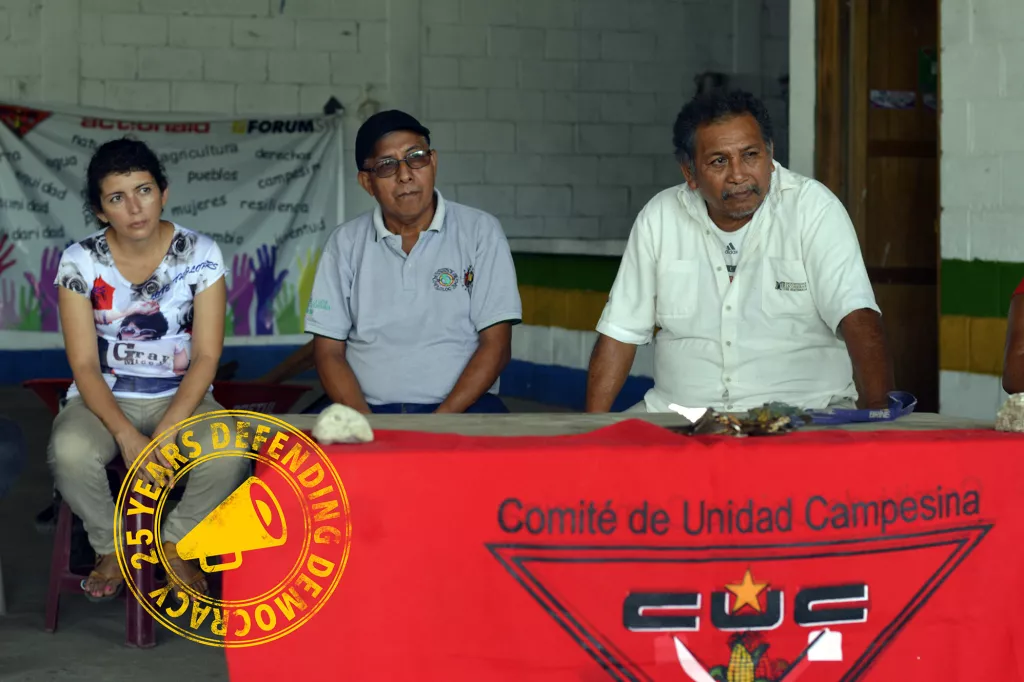Dalila and the struggle for rights in Guatemala: "People are no longer blind"

Nonetheless, local communities struggle with hope of a better future for them and their families, in their territories.
Dalila is one of the resolute leaders of these communities, organised under the Peasant Unity Committee (Comité de Unidad Campesina, CUC its acronym in Spanish), partner of Action Aid Guatemala.
After sharing with her a hectic two-day visit to different communities in the region, we have enough time to share an interview in a break after visiting the El Socorro county school. We sit under a tree to escape from the intense midday sun, while some children from the school start slowly gathering around us.
Her sweet and jovial appearance conceals a strong woman, a leader in the struggle of rural communities in the Cuautepec region.
Tell us about the work you do with the CUC here in this region.
I have been working in this organisation for 10 years, and we do different types of work, what we do is quite extensive. At the beginning we organise groups in the communities, we work with mixed groups: men, women, youth and children. We started working with children in schools, working with the Solidarity Link (Vínculo Solidario in Spanish) project, which we started children from a very young age, to teach them what the organization is, why we organize ourselves, and what our organization does nationally. And we continue to work with them as they grow, so that the fight is not lost and when the old people are no longer there, the young will remain.
What are the most serious threats facing communities in southern Guatemala?
Well, one of the main threats is that the water is running out here in the communities because of the monocultures that exist in our region, which are various: we have sugar cane, oil palm, banana, and rubber. These crops need a lot of water to survive. Unfortunately, almost all the communities of this municipality do not have potable water. Each house must make a well, drill the ground to draw its own water, and now there is no more water, where there used to be plenty of underground water.
Pertaining the physical risks that we run, the situation is quite complicated.
As soon as we start acting to defend rights, they are already legally persecuting us, suing us.
We already have several legal proceedings, at least here in our region there are nine colleagues - eight colleagues and me - who have been criminalised. There are some with an arrest warrant and others who have substitute measures. We are linked to the process, at least in my case it is for defending labour rights.
"What Dalila is defending is a constitutional right that has to do with access to health, that has to do with social security, against someone who did not comply with the law”, says Patricia Castillo, programme and project manager for Action Aid Guatemala.
The case in which Dalila is involved has to do with more than 260 workers who cannot enjoy Social Security because the employer did not pay the fees, despite the fact that he had it deducted from the workers’ salary, some of them for 35 years.
“The businessman kept that money and it turns out that by demanding the right to Social Security for these 260 workers, some of them have already died, and their families lost them without being able to enjoy their rights. Now it turns out that those who defend them, become sued. The law works backwards and wears out", continues Patricia Castillo. "These are very long processes, so it is a waste, a deliberate waste.”
Children keep on gathering around us while Dalila continues her account, while a few others run around, playfully chasing each other.
What are the usual charges against people who are defending the interests of communities?
The nine of us, we are prosecuted for aggravated usurpation. What they do is identify a crime that has more than five years of sentence, so that we cannot pay a fine and go free. Because here in our country if a crime does not exceed five years, we can pay a fine or bail and, we can go free. Since the crime of aggravated usurpation implies six to nine years in jail, then that is the crime that they prosecute us defenders for.
And besides judicial persecution?
In other cases, the persecution is not judicial, but rather murders to which we are exposed. They recently murdered colleagues from other organisations. In this region they assassinated a colleague who was defending the right to the service of electric energy, they came from a meeting in the capital city and followed them on the road. They were shot in the car they were coming from, there were several wounded and she died. These are the risks to which we expose ourselves by trying to defend the rights of those who have no voice, of those who are not listened to.
What is your opinion about this mechanism of persecution that companies and landowners are using?
Well, I think it is quite complicated, because the only thing we try to do is defend rights and since they cannot respond in any other way, they simply criminalise us or physically persecute us, as a pressure on us to quit.
What they seek is, as they say, behead the social movement so that everything stays the same and people stop fighting to seek justice.
“We speak of a criminalisation strategy that is deliberate in this perverse way of using the law to wear down social movements and human rights defenders", states Patricia Castillo. "The use of law and legal resources is an exercise of terrible power, especially by sectors such as business. This should not be the mechanism to handle the different points of view regarding what country we want, how we want to manage it, how we want to develop, how we want to grow economically.
Besides, these forms of criminalising people destroy people's lives, subject them to personal attrition, a family fatigue that is a punishment. In any judicial process there exists the principle of presumption of innocence, but in these cases people are punished once a lawsuit against them is initiated, with all its consequences; they are stigmatized, their social fabric is affected, their relationships with the community, their children and their partners are affected.”
The visit to El Socorro is ending, and we have to start our return to the city of Cuautepec before it gets dark, In general it is unsafe to travel by night on the country roads of Guatemala. Consequently, we hurry up the closure of our conversation with Dalila.
How have you worked in response to criminalization cases?
For the criminalisation cases in which we are prosecuted, we have a team of lawyers from CUC, thanks to the support of Action Aid. So if any type of problem arises here in the region, we are able to contact them quickly, and they come to investigate the Public Ministry, human rights or the competent institutions. They do legal clinics, they meet with the lawyers of other organizations and deliver legal clinics, analysing the cases and identifying the way forward for each case.
What has been for you the importance of international cooperation in southern Guatemala?
For us Action Aid has been of great importance in all these years. There has been a lot of support for the communities, children and families, in one way or another. Housing has been improved, as well as schools have been remodelled. The communities have been trained, now people are no longer blind as before, when they allowed themselves to be humiliated by businessmen. Before they did not fight for their labour rights.
Before, women did not dare to denounce if they suffered violence, they had to put up with it, not even knowing that they had rights. They did not know where to denounce if they were suffering violence. Instead, now they are denouncing violence, they ask us for accompaniment. There are cases -even of murder- that in past times went unpunished. So I believe that we are successfully setting precedents, discouraging the violation of our rights. So for me that is a good achievement, that now people in organized communities already know their rights and already have a voice. They still dare to denounce the violence that exists in the communities.

Change begins with people. People who raise their voices, who work together and who organise to demand democracy, equality, accountability and human rights. We want to tell you about the people and organisations that are fighting for a better life, for everyone. With the campaign Changemakers we give you an insight into how Forum Syd works to create change through our support to civil society and human rights defenders around the world.
Andra nyheter

The power of people powered Public-Private Partnerships
Public–Private Partnerships (PPPs) are often discussed in terms of roads, power plants, housing, and other large infrastructure projects. But as discussed on the People’s Partnership Podcast, PPPs are...

ForumCiv’s social media accounts labelled as “extremist materials” in Belarus
Important message to our Belarusian followers. Any interaction with our content can now lead to legal consequences in Belarus. Please read the information below and take the necessary precautions for...

ForumCiv enters new strategic partnership
ForumCiv is proud to announce a new three-year strategic partnership with Sida, totalling SEK 137 million.